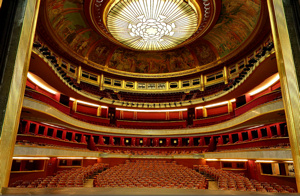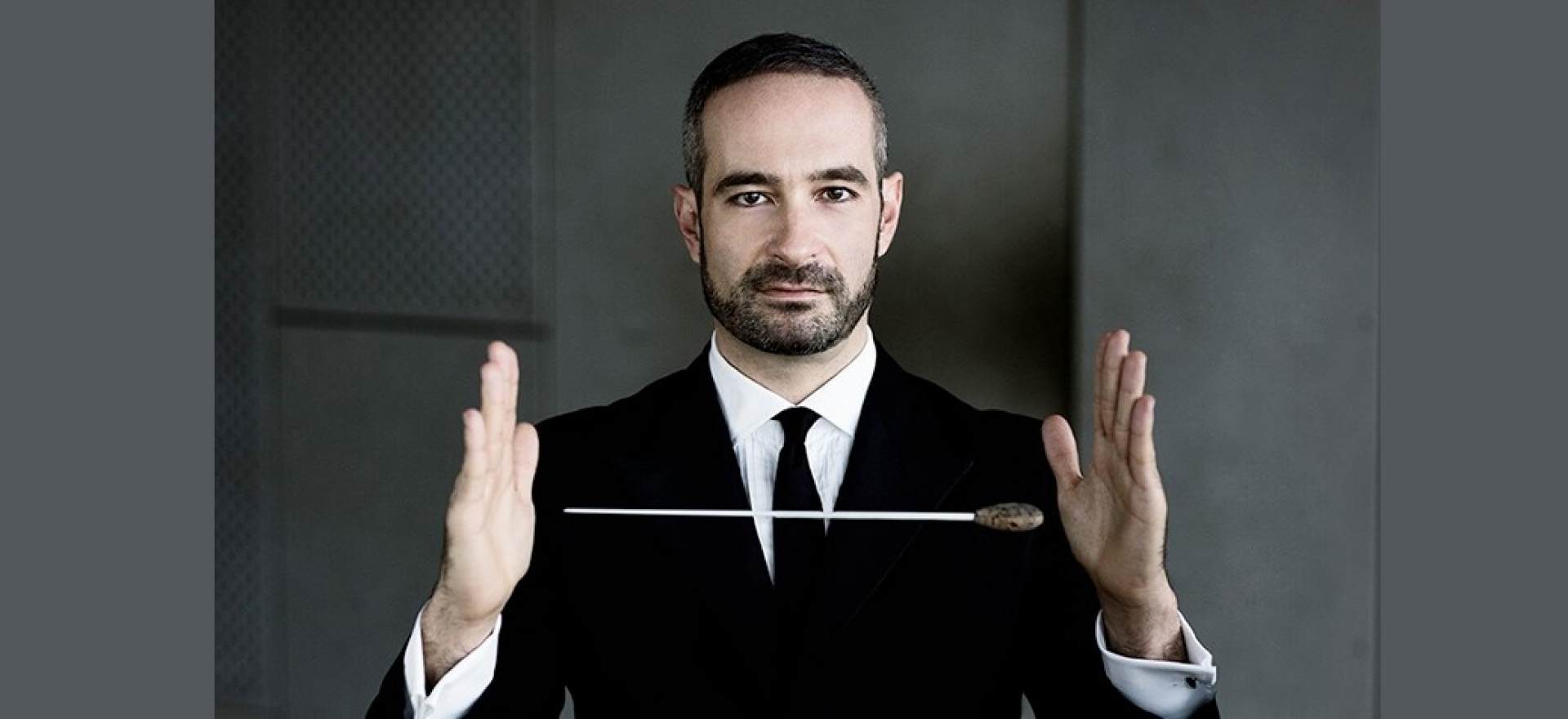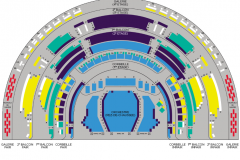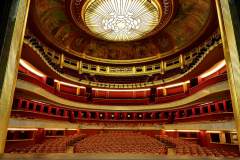Der Freischütz
April 2025 | ||||||
|---|---|---|---|---|---|---|
Mo | Tu | We | Th | Fr | Sa | Su |
Selling one’s soul to the devil, summoning up spirits, and magic bullets are all part of the fantastical world of the first German opera composed by Carl Maria von Weber in 1821. This lyrical drama owes a large debt to Beethoven’s Fidelio and prefigures Tannhäuser by Wagner. It introduces the symbolic world of German romantic opera which would peak fifty years later with Richard Wagner’s tetralogy.
Synopsis
Place: Bohemia
Time: At the end of the Thirty Years' War
Act 1
The young assistant forester Max loves Agathe and is to become the successor to Cuno, the head forester and Agathe's father. But a test of skill in marksmanship is required, the trial to be held the following day.
At a target shooting, Max loses to the young peasant Kilian, who is proclaimed "King of marksmen." (Chorus: "Viktoria! der Meister soll leben"/"Victory! Long live the master"; the good-naturedly mocking song of Kilian: "Schaut der Herr mich an als König"/"Let him gaze on me as king.")
Because Max has had ill luck for several days he easily falls under the influence of Caspar, who persuades Max to cast seven magic bullets to be used in the contest. Caspar, whose soul is to be forfeited to the devil on the following day, hopes to obtain three more years of grace by substituting Max in his place. (Trio: Cuno, Caspar, Max; chorus: "O diese Sonne"/"O the sun, fearsomely it rises.")
Left alone, Max sinks into deep melancholy at the thought of losing Agathe through failure at the shooting contest. (Aria: "Durch die Wälder"/"Through woods and fields.") Caspar with weird incantations tries to imbue him with courage. (Song: "Hier im ird'schen Jammerthal"/"Here in this vale of tears.")
He hands Max his gun loaded with a magic bullet, and to his own astonishment Max kills an eagle soaring at a great height. He resolves to go with Caspar at midnight to the terrible Wolf's Glen to cast the magic bullets, which will kill anything the shooter wants, in order to win the prize. Caspar, left alone, triumphs. (Aria: "Schweig! damit dich Niemand warnt"/"Silence, let no one warn him.")
Act 2
Agathe's chamber
Agathe is filled with sad forebodings. She sings of her meeting with a hermit in the forest, who told her that in some danger which menaced her, she would be protected by her bridal wreath. At the moment when Max shoots the magic bullet, the picture of Agathe's ancestor hanging against the wall falls to the floor, slightly wounding her. Agathe's cousin and companion Ännchen replaces it. (Duet: "Schelm, halt fest!"/"Rogue, hold fast, I will teach you.") Agathe is still more disturbed, but Ännchen endeavours to cheer her with jests. (Arietta: "Kommt ein schlanker Bursch gegangen"/"Comes a pretty boy this path.")
Agathe left alone awaits Max with the news of his success, which she decides to interpret as a favourable omen. (Recitative and aria: "Wie nahte mir der Schlummer ... Leise, leise"/"My eyelids droop in slumber ... Low, low, sacred words".)
Max arrives; he acknowledges that he has not been the victor, but explains that he has killed a deer, which he will bring this evening from the Wolf's Glen. Notwithstanding the prayers of Agathe and Ännchen, Max departs. (Trio: "Wie? Was? Entsetzen!"/"What, oh horror! there in the wolf's gorge?")
The Wolf's Glen at night
Caspar calls upon Samiel, the Black Huntsman, for assistance, and prepares the casting of the magic bullets. Max arrives and is warned by the spirit of his mother to abandon the project. Samiel conjures up the shape of Agathe, representing her as drowning herself in despair at Max's ill success, whereupon he plunges into the glen and with demoniacal noise the casting of the bullets is begun.
Act 3
Agathe's chamber
Agathe is praying. (Aria: "Und ob die Wolke sie verhülle"/"Through clouds obscure still shines the sun in radiant sky.") Her doubts have returned, owing to a dream of ill omen, but Ännchen again cheers her with laughter and song. (Romance and aria, subsequently added by Weber: " Einst träumte meiner sel'gen Base"/"My deceased cousin had a dream.") The bridesmaids arrive with the bridal wreath. (Song: "Wir winden dir den Jungfern-Kranz"/"We wind round thee the bridal wreath.") When Ännchen opens the box, however, she finds within a funeral wreath, which still further increases Agathe's misgivings. She is somewhat comforted by the memory of the hermit's promise that she shall be protected by her bridal wreath.
The meeting of the marksmen
Having split the seven bullets between them, Max has used four and Caspar has used three. Max demands Caspar give him his last bullet to use in the final shooting contest, but Caspar refuses. As Max leaves, Caspar shoots a fox, thus making Max's bullet the seventh and controlled by the Evil One.
The prize shooting
Prince Ottokar awaits Max at his tent. (Chorus of foresters: "Was gleicht wohl auf Erden"/"What excels the pleasures of the chase.") Max is now to shoot a dove. As he takes aim, Samiel, the black huntsman, appears to guide the bullet, and causes Max to fire at Agathe, who is apparently wounded. (Finale: "Schaut, o schaut"/"See, oh see, he shoots his bride.") Agathe falls, but her bridal wreath has deflected the bullet, which struck Caspar. Agathe revives from her faint. Caspar, seeing a holy hermit by her side, realizes that he has failed. Samiel grasps him instead of Max, whereupon Caspar expires with a curse upon his lips. Prince Ottokar orders the corpse to be thrown into the Wolf's Glen, then demands and receives an explanation from Max. In spite of pleas from Cuno, Agathe, peasants, and huntsman, the infuriated Prince pronounces the sentence of banishment. Before this can be carried out, however, the hermit enters into their midst. The Prince acknowledges the holy man, and asks for his counsel. The hermit explains that the combined effects of love for Agathe, and fear of losing her should he fail the shooting trial are what caused Max to stray from a life that was formerly without fault. The hermit goes on to condemn the trial shot, suggests a probationary year as penalty, and asks who among the assembled has looked into their own heart and would be willing to cast the first stone. If Max lives a faultless life, he will gain forgiveness and be permitted to marry Agathe. The Prince commends the hermit for his wisdom saying a higher power speaks through him. The Prince ends his pronouncement by saying he, himself, will place the hand of Agathe in that of Max when the probation is over. The opera ends with the ensemble singing prayers of thanks.
Program and cast
Sung in German, subtitled in French and English
Approximate running time 2h30
Charles Castronovo | Max
Golda Schultz | Agathe
Kyle Ketelsen | Kaspar / Samiel
Nikola Hillebrand | Ännchen
Jongmin Park | Kuno / Hermit
Milan Siljanov | Kilian
Sebastian Wartig | Ottokar
Antonello Manacorda | direction
Kammerakademie Potsdam RIAS Kammerchor
Théâtre des Champs-Élysées

The Théâtre des Champs- Elysées is undoubtedly one of the finest venues in Paris . Built in 1913 , it has the distinction of having been designed by a group of artists architects Henry Van de Velde and Auguste Perret , the painter and sculptor Antoine Bourdelle , the painter Maurice Denis , and the crystal- René Lalique to do mention the main ones . He was the first Parisian theater to be built entirely of reinforced concrete.
Restoration of the Great Hall devoted to operatic performances , symphony concerts and dance was decided in 1985. Two years later , on 23 September 1987, the theater reopened its doors , completely renovated. Fifteen years after this important work it was decided to undertake a new renovation campaign , but to prevent the complete closure of the theater for an entire season , work is now carried by step during the summer . Then it is to replace aging equipment , to remedy wear certain parts of the theater and improve spectator comfort and artists during their visit . Thus in recent years, including the work involved the renovation of marble facade, replacing the carpet in the room with wooden floors , installation of a new fully decorated wooden concert to a significant improvement of acoustics, the orchestra pit and stage below .
The Théâtre des Champs- Elysées is now a modern working tool receiving each year nearly 300,000 spectators and a few thousands of artists and collaborators.
The Théâtre des Champs- Elysées , the jewel of French architecture of the twentieth century, was in 1953 one of the first buildings of contemporary architectural heritage to be classified as historic monuments . Since 1970 the Caisse des Dépôts owns the entire building 15 avenue Montaigne and principal patron of the theater.
For over a century, Théâtre des Champs-Elysées has been the place where the most celebrated artists have come to make their names in Paris. The world’s finest orchestras and world-class soloists have always been a fixture at the Theatre. Théâtre des Champs-Elysées presents more than 200 concerts each year and is renowned for its outstanding performances of all genres, from classical music concerts and staged opera to contemporary dance and jazz.
How to reach us:
Subway: Alma-Marceau (line 9), Franklin D.Roosevelt (line 1), Pont de l’Alma (RER line C)
Bus: n° 42, 63, 72, 80, 92
Taxi station: Place de l’Alma, corner of avenue George V
Car park: Alma George V. The entrance is in front of n° 19, avenue George V
Fixed rate depending on the length of the performance. Payment upon entering.

 EN
EN DE
DE IT
IT FR
FR ES
ES RU
RU JP
JP RO
RO
 Seating plan
Seating plan 